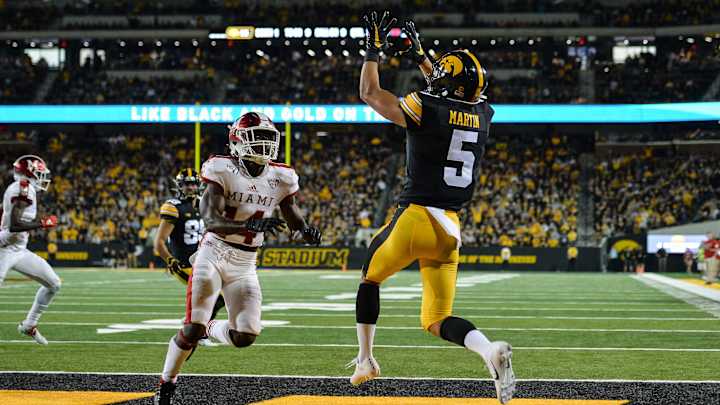Night Games Can Mean A Change In Routine For Hawkeyes

Toren Young appreciates the Kinnick Stadium night games.
“I mean, game days at Kinnick are already electric,” the Iowa junior running back said. “When the lights go on, it goes to another notch. Another level.”
But what about when the lights go off?
For the Hawkeyes, it's all about the post-game routine.
There are three television windows which Big Ten players have to deal with during the season.
The morning kickoff, usually at 11 a.m. Central time for the Hawkeyes. That means an early wake-up call, but much more time after the game to wind down.
The mid-afternoon kickoff, usually at 2:30 or 3 p.m. A normal wake-up call, and enough time to settle back after the game.
And then there’s the night game, with a lot of time to kill before the game and a sore body to deal with at bedtime.
The Hawkeyes get one of those this week, with Saturday’s home game against Penn State starting at 6:44 p.m.
It’s the second night game of the season for Iowa — the season opener against Miami (Ohio) started at 6:30 p.m.
The Hawkeyes are an early-morning team — practices during the week are in the morning — so the night games require some adjustments.
“Usually at 7 or 8 o’clock, I’m getting ready to go to bed,” fullback Brady Ross said. “But you change the routine, you know it’s coming all week.”
Sometimes that routine can get fouled. Iowa’s game at Iowa State on Sept. 14 was a 3 p.m. kickoff, but with two weather delays that totalled almost three hours, the game didn’t end until after 9. The Hawkeyes’ buses weren’t on the road until after 10:30.
“The Iowa State game kind of turned into a night game, and that was like kind of a weird dream,” Ross said of the Hawkeyes’ 18-17 victory. “The whole thing was … thank God we came out on top of it.”
“That was OK for me,” defensive coordinator Phil Parker said the week after the game. “I wasn't going to do anything else on Saturday.”
And really, that’s any Saturday game day for the Hawkeyes.
“It’s hard,” Ross said of winding down after a game. “It’s hard even when it’s a morning game or afternoon game. It doesn’t matter where it is or when it is.”
Wide receiver Ihmir Smith-Marsette, a junior, has played in enough night games in his career to know the routine, including after a game of hard hits.
“It depends on how the game goes,” Smith-Marsette said. “If you play, and you get hit a lot, or you’re a defensive player and you do a lot of hitting, it might take a while — you’re really sore and you’ve been playing 60 minutes and you get the adrenaline going.
“You go home, lay down, watch TV, play a (video) game, do what you do. Depending on the results of the game, go back, look at tape. Me, I just go home, lay down, let my body rest. I take a couple of shots here or there (on the field), so I just go lay down, let my aches and pains settle away, then get in my nice comfortable bed and sleep.”
How much sleep, though, might depend on the game’s result.
“You lose, you go home with a nasty taste in your mouth,” Smith-Marsette said. “You’re like, ‘I could have done this or done that better.’ But if you win, it’s way more easier to settle down. You reflect on what you could have done better, still, but you take the ‘W.’ The ‘W’ is always great.”
“It’s definitely a quicker turnaround,” Young said. “Really, you just hang out with your teammates, hang out around the house. It’s definitely a quicker turnaround from an 11 o’clock game.”
The consensus, though, was it’s game day, no matter the time.
“I don’t care, at all,” Ross said. “I can’t control it, so why have a preference, I guess.”
“In Kinnick, I like late games, because the atmosphere is really different,” Smith-Marsette said. “To me, it doesn’t matter. I’ll be ready to go at 11 o’clock, 2:30, 3:30, 7:30, I’ll be ready to go whenever.
“Ultimately, when the ball is kicked off, I’ll be ready.”
